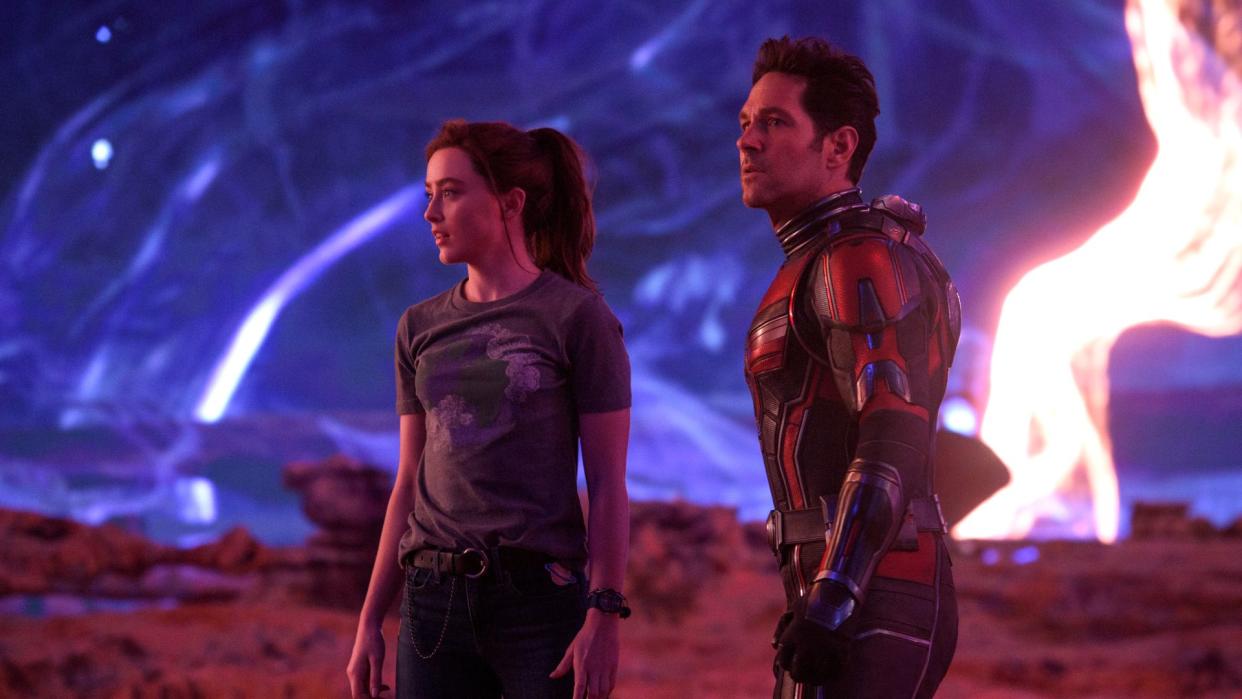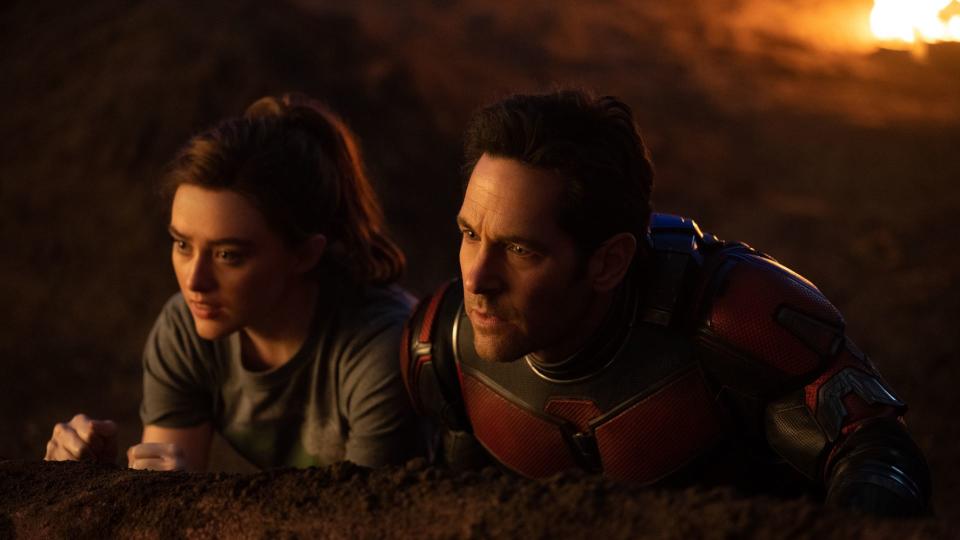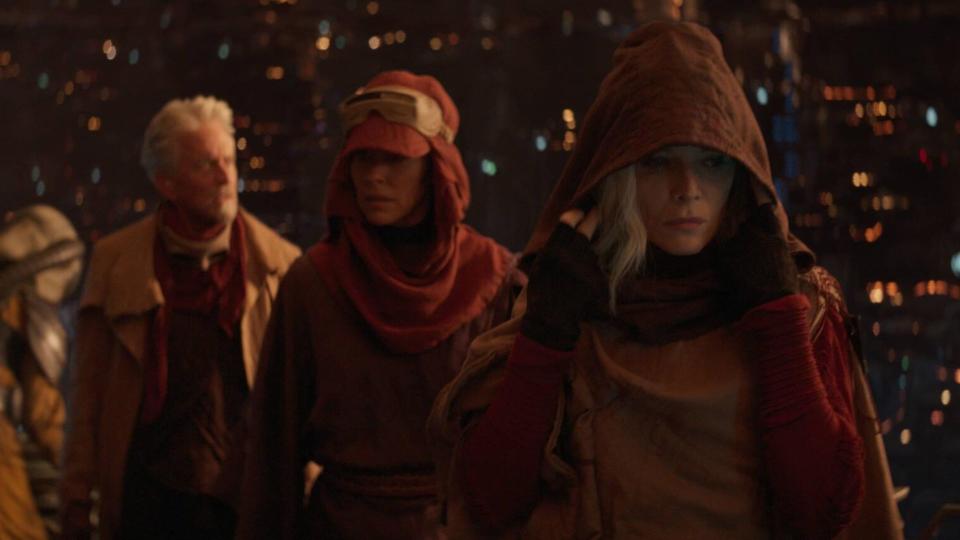2023's most divisive Marvel movie quietly introduced the MCU's most fascinating idea in years

- Oops!Something went wrong.Please try again later.
- Oops!Something went wrong.Please try again later.
- Oops!Something went wrong.Please try again later.
- Oops!Something went wrong.Please try again later.
With the benefit of hindsight, it’s both baffling and amusing that Kevin Feige decided to hinge the future of the Marvel Cinematic Universe on Ant-Man 3. While the resoundingly popular No Way Home marked the official introduction of Marvel’s Multiverse Saga – using it as a chance to unite three beloved Peter Parkers – it was Quantumania that debuted Thanos’ replacement. Or, more accurately, replacements.
And make no mistake, this was set to be Kang’s era: as the defining figure in the next stage of the adventure, Marvel Phase 6 was set to rotate on his axis. At least, that was the plan.
Actor Jonathan Majors has now been dropped by Marvel, sending the MCU's future into question. But even before this, there were doubts. Since the launch of Ant-Man 3, an unsavory cocktail of diminishing box-office returns and behind-the-scenes chaos has turned Feige’s grand plan into dust.
Ant-Man 3 wasn’t the cause of this decline, necessarily, but a symptom of it. Serving only as a cog within a larger narrative, and viewed alongside Guardians of the Galaxy Vol. 3, Sony’s Across the Spider-Verse, and The Marvels, it’s comfortably 2023’s most maligned Marvel movie. But it didn’t have to be. Amid all the sludge, it contains Marvel’s most promising, fascinating idea in years.
Wasted potential

Buried in a throwaway line toward the start of the movie, before any Quantumania has ensued, Cassie Lang argues with her father over her recent arrest for interfering with some cops hassling the city’s homeless population. "What was I supposed to do? Look the other way?" she asks Scott, indignant at his 'mind your own business' attitude. "They were clearing out a homeless camp in the middle of the night. And where do they expect them to go? It’s not their fault that they lost their homes in the blip. No one can even afford rent right now unless you’re some trust-fund asshole."
It’s a little jolt of electricity before the movie returns to its stupor – a tantalizing thread of wasted potential. This could have been the sign of a franchise genuinely interested in reckoning with its own consequences, and interested in constructing a tangible universe through thoughtful worldbuilding. For a brief moment, the MCU asks: what would the repercussions actually be if half the population vanished and then reappeared years later?
Of course, The Falcon and The Winter Soldier also reflected on this, in its own half-hearted way. But, the second (and largely forgotten) Disney Plus Marvel series only uses the chaos caused by Thanos’ actions as a peripheral backdrop to the real story being told. It’s not enough, and Feige shouldn’t forget what the 'C' in 'MCU' stands for.
So, perhaps, instead of journeying to the Quantum Realm, Scott and co. could have had a more grounded adventure. They could have wrestled with the social impact of the blip, battling the inevitable human vultures that seek to exploit the tragedy for greed. Who is the increase in rent prices benefitting? What is life like for those who’ve found themselves suddenly brought back to reality, and homeless? Why aren’t our superheroes interested in helping them? It leaves enough unanswered questions to easily fill a whole movie or, more ambitiously, a whole Phase.
Human consequences

But the intention behind the dialogue isn’t to explore this. It’s shorthand to establish the friction between Cassie and Scott; to show his protectiveness over her, and his residual guilt that she was forced to grow up without a father because of his extracurricular superhero activities. It’s successful in that regard, yes, but also incredibly frustrating, as we’re left with the prospect of Marvel’s most interesting idea in a long time, forever unfulfilled. Rather than engaging with its own ideas, Ant-Man 3 insists on serving up superficial pseudo-strangeness designed to mask its banality, and commands us: "Forget the rent crisis and homelessness epidemic we mentioned earlier. Enjoy the Quantumania!"
The truth is, though, that the consequences of the blip are a more compelling villain than Kang, certainly in the immediate wake of Thanos’ grand exit. Maybe, a more patient version of the MCU (which probably exists, somewhere out there in the Multiverse) focussed on this for a while, allowing for breathing room before rushing towards its next big bad.
Whether 'superhero fatigue' exists or not (and the evidence increasingly points to the idea that it does), it’s possible that a more grounded approach to the future of the MCU – building more slowly toward another epic climax – could have helped to maintain audiences’ investment, continuing Thanos’s story by examining the disastrous impact of his actions.
Instead, all the MCU tells us by abandoning the fallout of the blip is that it isn’t bothered about taking itself seriously. What other explanation is there, when it gives us such a cataclysmic event, tells us how cataclysmic it is, and then ignores it and points vaguely toward the Multiverse instead?
There are a multitude of lessons Feige’s Marvel needs to learn in the wake of 2023 (its most challenging year to date) in order to get back to firmer ground. As Marvel commits to shattering reality as we know it, the notion that this franchise can’t simply bypass the implications of its own storytelling is an important one if the MCU is to have any serious chance of gripping audiences’ imaginations again.
For more on the year in review, check out our guides to the best movies of 2023 and the best TV shows of 2023.

